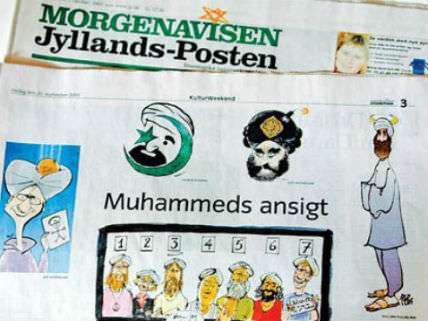The Human Right to Offend
Self-censorship in the face of intimidation has another name: cowardice.

The Tyranny of Silence: How One Cartoon Ignited a Global Debate on the Future of Free Speech, by Flemming Rose, translated by Martin Aitken, Cato Institute, 240 pp., $24.95
No human right is more important than free speech. Without it no other rights can be asserted and defended. Free speech—the right of anyone to criticize and evaluate the claims of anyone else—is the best environment for discovering political, social, economic, and scientific truths. Political, religious, and ideological absolutists cannot tolerate criticism that punctures and wounds their delusions and dogmas. They look for ways to shut the offensive speakers up, including murder.
In addition to killing specific critics, such murders also terrorize others into self-censorship. That was the aim of the assassinations earlier this year at Charlie Hebdo in Paris and at the Krudttonden Café in Copenhagen.
Any attacks on free speech and the free press must be fiercely rejected, Flemming Rose argues in his passionate new book, The Tyranny of Silence. Rose knows whereof he speaks. He is the editor who commissioned drawings of Muhammad to illustrate an article on free speech for the Danish newspaper the Jyllands-Posten in 2005. Rose was inspired by the news that several illustrators had declined to draw Muhammad for a children's book out of fear of violent Muslim reprisals. His aim was to "highlight self-censorship and its effects on cultural life" and "to fight fears that underlay self-censorship." Rose further argued that it was condescending and even racist to presume that Muslims were intolerant and would react violently to cartoons depicting their prophet.
Sure enough, while many Muslims found the illustrations offensive, most did not react violently. But some Islamist extremists did issue death threats, and several have attempted to murder some of the cartoonists. For example, a Muslim named David Headley was arrested in 2009 for planning an attack on the Jyllands-Posten offices that eerily parallels the later assault on Charlie Hebdo. Offended Islamists have twice tried to kill cartoonist Kurt Westergaard, who drew the famous image in which Muhammad's turban contained a lit bomb. Rose reports an incident in which a Muslim man shouted at Westergaard, "May you burn in hell!" To which Westergaard coolly replied, "Can we talk about it now, or should we wait until we meet there?"
Riots broke out in many majority-Muslim countries, and mobs attacked several Danish embassies. Officials from several Muslim nations demanded that Denmark and other European countries apologize for the offensive cartoons and prevent any similar offenses in the future. ("Muslims were now demanding that non-Muslims, in non-Muslim countries, adhere to Islamic precepts," Rose observes.) And the Organization of the Islamic Conference has stepped up its efforts to get the United Nations behind a ban on "the defamation of religion." Such a move would essentially globalize restrictions on blasphemy.
As alarming as the actions of Muslim governments and individual believers have been, the reactions of many European governments and some supposed guardians of free speech have been even more dismaying. In Denmark, the public prosecutor considered bringing a case against the newspaper for blasphemy or racism. Out of fear of Islamist attacks, art exhibitions have been sanitized, movies suppressed, and people punished for "hate speech." The European Court of Human Rights has defined hate speech as "all form of expressions which spread, incite, promote, or justify hatred based on intolerance (including religious intolerance)." This completely turns the concept of tolerance on its head.
As Rose correctly argues, tolerance properly understood is the ability to accept speech one dislikes. "When we focus on non-discrimination and equality, and aim to empower the aggrieved, tolerance is no longer about the ability to tolerate things we don't like," he explains. "It becomes the ability to keep quiet and refrain from saying things that others may dislike." Calls to ban offensive speech sacrifices diversity of expression in the name of respecting diversity of culture. "If we accept the idea that people have a right not to be offended, we will end up with a tyranny of silence, for almost any speech may be deemed offensive," declares Rose.
Insult fundamentalists justify their efforts to restrict speech with the catchphrase, "Freedom of speech is not the same as the freedom to offend." In fact, there is no freedom of speech if people cannot offend those who would deny women equal rights, persecute homosexuals, and commit violence against people who do not share their faith. "The idea that if you say something that might be construed as offensive, you somehow restrict the liberty of others is nonsense," argues Rose. He is entirely right.
Rose praises the United States for its strong protections of free speech based on the First Amendment. And yet there are Americans who believe that certain speech is so offensive that it warrants a violent response. Last year Mireille Miller-Young, a sociologist at the University of California, Santa Barbara, grabbed a graphic anti-abortion poster displayed at a table on campus where two pro-lifers were handing out literature. Arguing much like Muslims offended by the Muhammad cartoons, she defended her actions by saying that the images constituted "hate speech" that had "triggered" her vandalism. Happily, she was sentenced to three years of probation for her attempt to suppress speech she disliked.
Nothing undercuts the power and propaganda of tyrants and religious zealots more than the right of people to speak and write uncensored. In a free society, people can pursue and propound their own versions of the truth. In a fear society, everyone must submit to and live with lies. Societies in which citizens can speak freely flourish; societies muzzled by despots shrivel.
"We know from history that if we submit to terror and threats; what we do not get is less terror and fewer threats," writes Rose. "What we get is more terror and more threats." Self-censorship in the face of intimidation has another name: cowardice.


Show Comments (94)